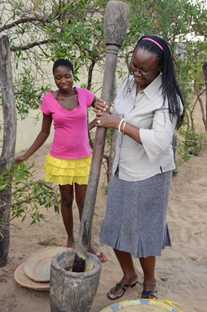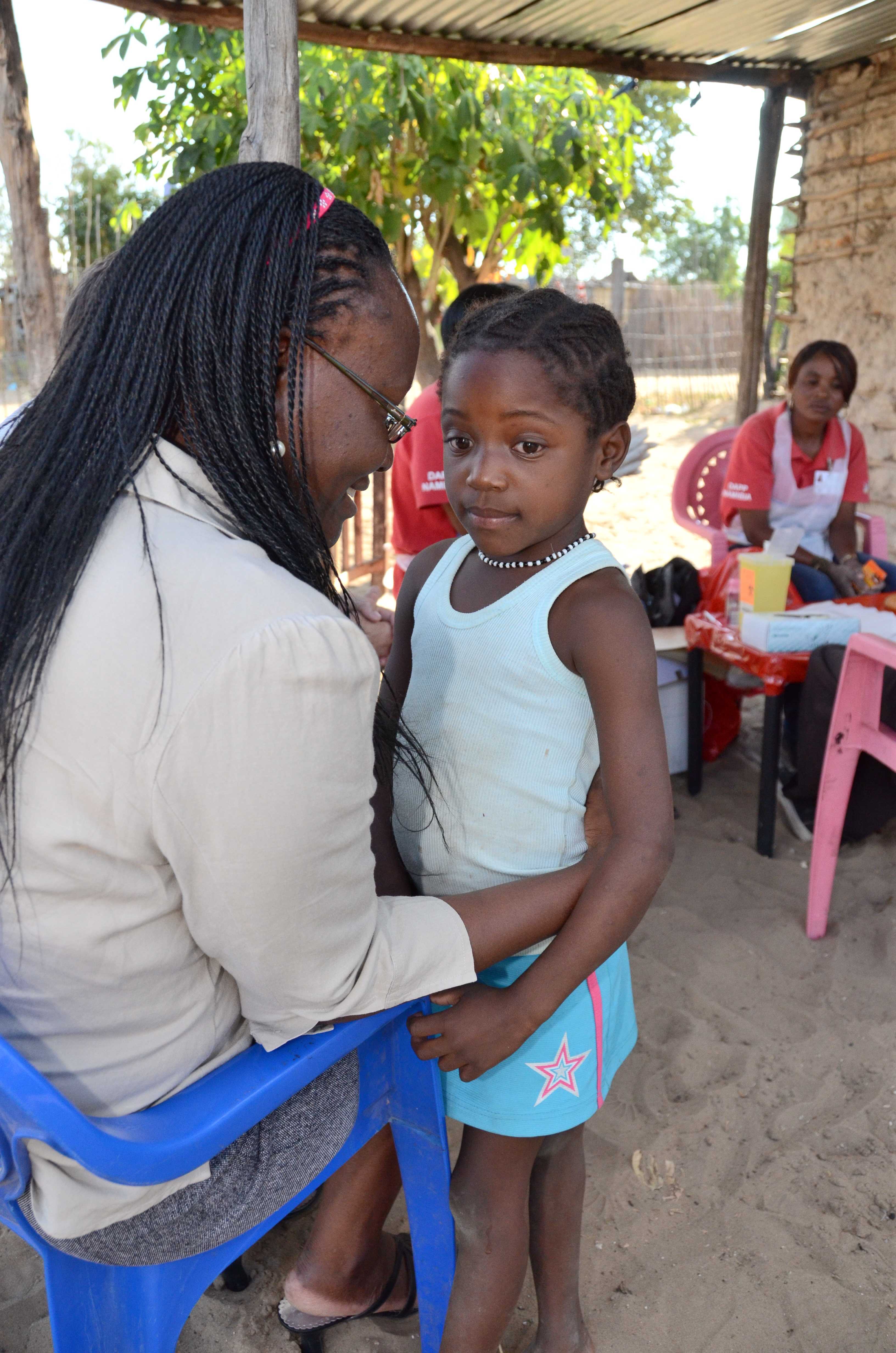Saving Lives and Improving HIV Care in Namibia

Naemi Shoopala, CDC-Namibia Field Office Coordinator, takes a break from a site visit to try her hand at grinding the grains used to make porridge in a small settlement outside Rundu, while talking to a teenage girl about HIV prevention.
Ms. Naemi Shoopala, a nurse with passion for mentoring and capacity building, is on a mission to save lives and improve the quality of HIV/AIDS services in Namibia. She has nursed HIV-positive mothers and children back to health and seen the seriously ill regain hope thanks to CDC through the U.S. President’s Emergency Plan for AIDS Relief (PEPFAR).
Naemi, who joined CDC-Namibia in October 2006 as the HIV/AIDS Program Field Coordinator, leads the CDC Field Office in northern Namibia. The office provides technical assistance at decentralized levels through site visits, mentorship, and quality improvement programs. The office has four nurse mentor positions and is co-located within one of the three referral hospitals in the country.
A rapid turnaround
“When we opened the office the first thing we did was to conduct an inventory of HIV services in northern Namibia to better understand what was available and what was needed,” Naemi remembers.
The inventory found that less than 10% of facilities were providing any HIV service, even though the regions had the highest rates of HIV prevalence in the country—a shocking result that motivated the Ministry of Health and Social Services (MoHSS) to accelerate the roll-out of HIV services. Seven years later, over 95% of facilities provide HIV counseling and testing (HCT), prevention of mother-to-child transmission (PMTCT) services, and early infant diagnosis services, thanks in part to the efforts of Naemi and her team. Namibia now has 87% antiretroviral treatment coverage and over 90% PMTCT coverage, some of the highest rates on the continent.

Naemi speaks to a six year old girl while her parents recieve pre-test counseling during a home-based HIV testing session
Guidance for success
The CDC Field Office works with program managers and health care workers in six of Namibia’s 13 regions. The nurse mentors cover 17 health districts and 206 facilities, a sizeable proportion of the total number in the country. Naemi, as the lead nurse mentor, models and coordinates technical assistance to all of these sites, balancing support for on-going activities with the implementation of new initiatives.
In addition to ensuring the quality of routine HIV/AIDS services, the nurse mentors are critical to the success of pilot, operational research, and novel surveillance programs. From the scale-up of voluntary medical male circumcision to the use of Integrated Disease Surveillance and Response (IDSR) systems to the rollout of door-to-door HCT, Naemi offers expert guidance to the other nurse mentors, MoHSS managers, and facility staff.
“My motto is simple: if someone else can do it, we can do it. The key is to learn from others and apply their best practices,” Naemi explains.
An inspirational mentor
Naemi’s passion is a product of her education and over 12 years of nursing and public health experience. Her education includes a Diploma in Nursing and Midwifery, a Bachelor’s Degree in Nursing Science (Advanced Practice) with a focus on nursing education, a graduate certificate in HIV prevention and policy from Emory University, and a Master’s Degree in Public Health.
“What makes me happy is to go out to a facility, sit with a nurse, mentor him or her, come back in a few weeks, and see that nurse providing even better care and producing even better data. I know that good quality mentorship can produce good clinical work. That’s what keeps me going,” concludes Naemi.
Date: 2013
Update: On April 2, 2014, Naemi ‘s dedication was recognized by the U.S. Department of Health and Human Services with their first annual Locally Employed Staff of the Year award. Selected from among more than 1,800 eligible individuals, Naemi was cited for her exceptional leadership and unwavering commitment in the fight against HIV/AIDS.
Namibia Country Profile
For more information on CDC-Namibia, read the latest PAMWE Issue (June 2014), a public health magazine published by CDC-Namibia.
- Page last reviewed: July 22, 2014
- Page last updated: July 22, 2014
- Content source:


 ShareCompartir
ShareCompartir